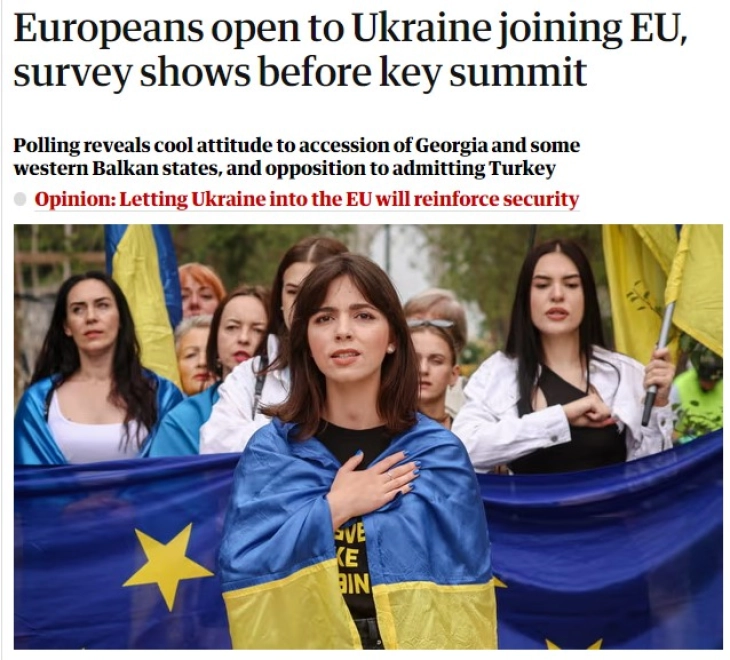Europeans open to Ukraine joining EU, but not towards Western Balkans; 26% support North Macedonia’s accession
- In a recent survey conducted across six EU member states ahead of this week's EU Summit, Europeans are open towards Ukraine's accession to the EU. However, skepticism looms regarding the admission of countries from the Western Balkans, Georgia, and Turkey, as reported by the British newspaper The Guardian.

Brussels, 12 December 2023 (MIA) – In a recent survey conducted across six EU member states ahead of this week's EU Summit, Europeans are open towards Ukraine's accession to the EU. However, skepticism looms regarding the admission of countries from the Western Balkans, Georgia, and Turkey, as reported by the British newspaper The Guardian.
Europeans are generally open to the idea of Ukraine joining the EU, despite the costs and risks, but lukewarm at best about the bloc’s prospective enlargement to also take in Georgia and countries in the western Balkans, according to a survey.
The European Commission recommended last month that formal accession talks begin with Ukraine and Moldova. The EU’s 27 heads of government are due to discuss the proposal at a Brussels summit this week – although Hungary’s prime minister, Viktor Orbán, has repeatedly said he opposes opening negotiations with Kyiv.
The polling, of six EU member states for the European Council on Foreign Relations (ECFR), found considerable support for the candidacies of Ukraine and, to a lesser extent, Moldova and Montenegro, but also deep economic and security concerns.
However, there was widespread opposition to the eventual accession of Turkey in particular, as well as a markedly cool response to the prospect of Albania, Bosnia, Georgia, Kosovo, North Macedonia and Serbia joining the union.
The polling found support for Ukraine’s entry highest in Denmark (50%) and Poland (47%), with opinion roughly divided in Romania (32% for, 29% against), Germany (37% for, 39% against), and France (29% for, 35% against). Austria was 52% opposed.
However, 45% of respondents were concerned Ukraine’s accession would have a negative impact on the EU’s security, against 25% who felt it would enhance it, while 39% believed Kyiv’s entry would negatively affect their country’s security.
Many Europeans saw no economic benefit to Ukrainian membership. While 43% of respondents in Poland and 37% in Romania saw a positive impact for the EU’s economy, 54% in Denmark and 46% in Austria foresaw a cost.
In Austria (42%) and Germany (32%), however, the most prevalent view was that Ukrainian membership would reduce the EU’s political power in the world, while respondents in France and Romania were more evenly split.
The ECFR identified a clear divide between “old” and “new” EU member states on the broader principle of enlargement. Respondents in Austria (53%), Germany (50%) and France (44%) were the most likely to feel the EU should not admit new members.
By contrast, in Romania a majority (51%), and in Poland a plurality (48%), believed the EU should be looking to expand. Denmark was somewhat of an outlier among the “old” member states, with only 37% opposing any immediate enlargement.
The survey found strong opposition to the possibility of Turkey joining the EU, with 51% of those surveyed across the six countries opposing the idea and fewer than one in five respondents supporting any forward movement on Turkish membership.
Europeans also showed themselves cool on Albania, Bosnia and Herzegovina, Kosovo, Georgia, Moldova, Montenegro, North Macedonia and Serbia becoming member states, with less than 30% support jointly for the eight countries joining.
Support for accession was softest for Kosovo, with 20% saying it should be able to join and 37% saying it should not, Albania (24% for, 35% against), Serbia (25% for, 35% against) and Georgia (25% for, 31% against).
Opinion was more evenly divided on North Macedonia (26% for, 27% against) and Bosnia and Herzegovina (28% for, 29% against), while there was support for Moldova (30% for, 28% against) and Montenegro (30% against 25%) joining the EU.
While this week’s summit would focus on pathways to membership for Ukraine and others, the debate about how exactly to achieve it “has scarcely begun”, said Piotr Buras, a senior ECFR policy fellow, who called for a “concrete timeline” for accession.
“Geopolitical rhetoric from Brussels is masking deep concerns in member states about the potential consequences of enlargement, and widespread scepticism about the EU’s ability to absorb new members,” Buras said.
A timeline would provide space for internal EU reforms, build resilience, and show the public why enlargement was essential, he said.
Engjellushe Morina, another ECFR senior fellow, said the summit may be “the most consequential of recent EU history”.
Photo: Print screen







